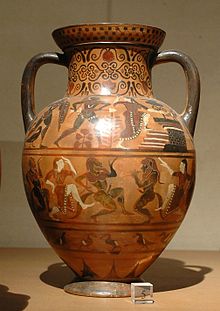amphora
Jump to navigation
Jump to search
See also: âmphora
English[edit]

Etymology[edit]
From Latin amphora (“large wine vessel, Roman unit of liquid measure”), from Ancient Greek ἀμφορεύς (amphoreús, “two-handled pitcher, Greek units of liquid measure”), ultimately from Mycenaean Greek 𐀀𐀠𐀡𐀩𐀸 (a-pi-po-re-we, “carried on both sides”).
Pronunciation[edit]
- IPA(key): /ˈæmfəɹə/
- IPA(key): /æmˈfɔ(ː)ɹə/ (prescriptively "incorrect" but common; /ˈa-/ in Latin)
Audio (US) (file)
Noun[edit]
amphora (plural amphoras or amphorae or amphorai)
- (chiefly historical) A large vessel, especially a thin-necked clay vat used in ancient Greece and Rome for storing and transporting wine and oil.
- 1914, John L[inton] Myres, Handbook of the Cesnola Collection of Antiquities from Cyprus, New York, N.Y., page 76:
- By concurrent use of panel decoration and concentric-circle ornament, and by free employment of red paint, the fully developed style of the Geometric Period attains a wide range of rich and elaborate effects. These are best displayed on the necks and shoulders of the very large amphorai which are characteristic of this period.
- 1973, T[homas] B[ertram] L[onsdale] Webster, Athenian Culture and Society, London: Batsford, →ISBN, page 137:
- A complete set for a ten-man symposion (an ordinary size) with ten deep cups, ten shallow cups, two mixing-bowls, two wine-jugs, two hydriai, two amphorai would cost in the neighbourhood of forty drachmai, and that would not be an unreasonable price for a rich man for a special occasion.
- 1997, Jonathan M[ark] Hall, Ethnic Identity in Greek Antiquity, Cambridge University Press, published 2004, →ISBN, page 133:
- Traditionally, the style of an artefact has been separated from its function. Thus, the function of a Greek pot – defined in terms of whether it was intended for transportation (hydriai or large amphorai), storage (pithoi and some kraters), distribution (oinokhoai) or consumption (cups, skyphoi and plates) – tends to be treated separately from any painted decoration on its surface.
- (historical) A Roman unit of liquid measure reckoned as the volume of 80 Roman pounds of wine and equivalent to about 26 L although differing slightly over time.
- (historical) A Roman unit of ship capacity, similar to tonnage.
- (botany) A lower valve of a fruit that opens transversely.
Synonyms[edit]
- (unit of liquid volume): Roman amphora, quadrantal, amphora quadrantal
Coordinate terms[edit]
- (large vessel): bottle, jug, keg, barrel, cask, tun
- (unit of liquid volume): lingula (1/2304 amphora), cyathus (1/576 amphora), acetabulum (1/384 amphora), quartarius (1/192 amphora), hemina (1/96 amphora), sextarius (1/48 amphora), congius (⅛ amphora), urna (½ amphora), culeus (20 amphoras)
Derived terms[edit]
Related terms[edit]
Translations[edit]
large clay vessel used in ancient Greece and Rome for storing wine and oil
|
Anagrams[edit]
Latin[edit]
Etymology[edit]
From Ancient Greek ἀμφορεύς (amphoreús, “two-handled pitcher, units of liquid measure”). As a Roman unit, originally an elision of amphora quadrantal.
Pronunciation[edit]
- (Classical) IPA(key): /ˈam.pʰo.ra/, [ˈämpʰɔrä]
- (modern Italianate Ecclesiastical) IPA(key): /ˈam.fo.ra/, [ˈämforä]
Noun[edit]
amphora f (genitive amphorae); first declension
- (chiefly historical) amphora, a large vessel, especially one made of clay with two handles used for storing and transporting wine and oil
- (historical) amphora, a Roman unit of liquid measure equivalent to about 26 L
Declension[edit]
First-declension noun.
| Case | Singular | Plural |
|---|---|---|
| Nominative | amphora | amphorae |
| Genitive | amphorae | amphorum amphorārum |
| Dative | amphorae | amphorīs |
| Accusative | amphoram | amphorās |
| Ablative | amphorā | amphorīs |
| Vocative | amphora | amphorae |
The genitive plural amphorārum has the alternative form amphōrum which is especially used in contexts of liquid measure.
Synonyms[edit]
- (unit of liquid measure): quadrantal, amphora quadrantal
Coordinate terms[edit]
- (unit of liquid volume): lingula (1/2304 amphora), cyathus (1/576 amphora), acetabulum (1/384 amphora), quartarius (1/192 amphora), hemina (1/96 amphora), sextarius (1/48 amphora), congius (⅛ amphora), urna (½ amphora), culeus (20 amphorae)
Derived terms[edit]
Descendants[edit]
- Catalan: àmfora
- French: amphore
- Galician: ánfora
- Italian: anfora
- Portuguese: ânfora
- Spanish: ánfora
- → English: amphor
- → German: Amphore
- →? Proto-West Germanic: *ambrī (see there for further descendants)
References[edit]
- “amphora”, in Charlton T. Lewis and Charles Short (1879) A Latin Dictionary, Oxford: Clarendon Press
- “amphora”, in Charlton T. Lewis (1891) An Elementary Latin Dictionary, New York: Harper & Brothers
- amphora in Charles du Fresne du Cange’s Glossarium Mediæ et Infimæ Latinitatis (augmented edition with additions by D. P. Carpenterius, Adelungius and others, edited by Léopold Favre, 1883–1887)
- amphora in Gaffiot, Félix (1934) Dictionnaire illustré latin-français, Hachette.
- “amphora”, in The Perseus Project (1999) Perseus Encyclopedia[1]
- “amphora”, in Harry Thurston Peck, editor (1898), Harper's Dictionary of Classical Antiquities, New York: Harper & Brothers
- “amphora”, in William Smith et al., editor (1890), A Dictionary of Greek and Roman Antiquities, London: William Wayte. G. E. Marindin
Categories:
- English terms borrowed from Latin
- English terms derived from Latin
- English terms derived from Ancient Greek
- English terms derived from Mycenaean Greek
- English 3-syllable words
- English terms with IPA pronunciation
- English terms with audio links
- English lemmas
- English nouns
- English countable nouns
- English nouns with irregular plurals
- English terms with historical senses
- English terms with quotations
- en:Botany
- en:Vessels
- en:Units of measure
- en:Ancient Greece
- en:Ancient Rome
- en:Shipping
- en:Wine
- en:Two
- Latin terms borrowed from Ancient Greek
- Latin terms derived from Ancient Greek
- Latin 3-syllable words
- Latin terms with IPA pronunciation
- Latin lemmas
- Latin nouns
- Latin first declension nouns
- Latin feminine nouns in the first declension
- Latin feminine nouns
- Latin terms with historical senses
- la:Vessels
- la:Ancient Rome
- la:Units of measure
- la:Wine
